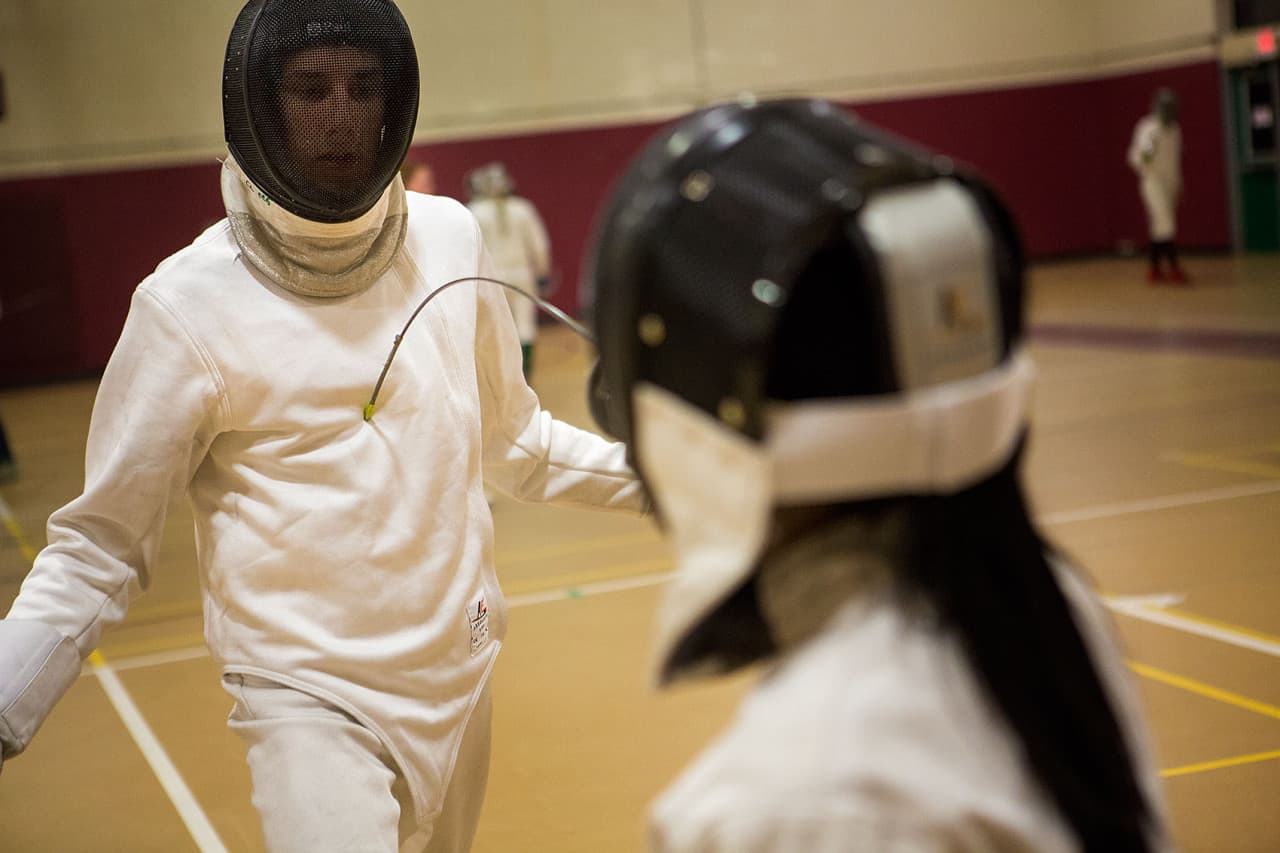Advertisement
En Garde! High School Fencing Program Celebrates 50 Years
Elliot Lilien began the fencing program at Concord-Carlisle High School in Massachusetts and ran it for 20 years. This year, that program is celebrating its 50th anniversary. In his youth, Lilien had competed at the University of Chicago, where, 20 years ago, fencing got slashed.
"They abolished the sport, and I went to see the chancellor, and I said, 'Mr. Chancellor, this is a really good sport, and it's really good for people, and it's a lifelong sport, too,'" Lilien said. "He looked at me and said, 'We have no opponents.' I had no answer to that."
"It's not really a rival kind of sport. It's more a friendly sport, even though you're stabbing people with swords."
Mackenzie King, Concord-Carlisle fencer
"We started with just boys, and then we had girls the second year, and the director said, 'We have two kinds of sports: competition and recreational,'" Lilien said. "Men's are competition, and women's are recreational. Women's recreational lasted until the first meet."
"When you first began the program 50 years ago," I asked, "did you ever imagine that it would still be going strong in 50 years?"
"I didn't think about," he said. "But I'm very grateful that it has been, and that this high school has been willing to support it."
Some of Lilien's first recruits showed up hoping to bring Dungeons & Dragons to life with swords. He had to teach them that the sport required not fantasy but discipline, balance, tactics, psychology, and brains — most of the time.
"Of course, if you're faster than anyone else, and stronger, it becomes less important," Lilien said.
"The mental part of it?" I asked.
"If you can launch a gigantic attack, it doesn't make any difference how smart the other person is. He's gonna get hit," Lilien answered.
Choose Your Weapon
But who were those people 50 years ago drawn to fencing, rather than to the traditional high school sports?
"Outside of the fantasy people?" Lilien asked.
Yes. Outside of the fantasy people.

"At Princeton, they did a series of studies," he said. "They tried to gauge which athlete was most terrified before the event. Who do you think it was?"
"I'm gonna guess a boxer," I said.
"Wrestler. To be grabbed and thrown down, and sat on in front of other people is very frightening. But fencing was second."
The study suggested that nobody liked to be jabbed, stuck, or slashed by a guy wearing a mask.
"But Princeton also did another thing, where they did the grade and intelligence level of all the sports," Lilien continued. "Fencing's number one."
At a recent tournament in their home gym, Mackenzie King was among the many Concord-Carlisle fencers to perform well. After a bout she'd won, she explained how she'd done it:
"Ah, well, the girl I was fencing, she kind of doesn't really have any sort of plan in mind when she's doing anything, so when she was coming at me, I just kind of moved her blade out of the way and hit her," King said.
Advertisement
"That sounds easy," I said.
"Yeah, it can be."
Around us, fencers from 13 schools were thrusting and parrying. There was a clicking and clanging of weapons. It wasn't clear which palpable hits were legitimate.
What I was watching became less confusing when Jay Powers, whose son, Trey, is a senior on the Concord-Carlisle team, explained some of fencing's finer points. (Get it? Points?) Anyway, Jay Powers thinks fencers choose their weapons according to their personalities.
"We're watching epee here. Now everything in epee is target," he said. "And so this is sort of closer to what you would think of, the two French guys, like one slapping the other with the glove to challenge him to a duel."
Foil fencers, on the other hand, have to avoid the arms, legs, and head. Then there are the folks with the sabres.
"And sabre is more the slashing weapon," Powers explained. "You can do a point attack with a sabre, but it's mostly — so you know, those really aggressive guys. They gravitate toward, 'I want to be a sabre fencer. Rah, rah, rah.'"
Powers fenced at Concord-Carlisle himself. He held on to his equipment after he retired from the sport, and his son stumbled upon it when he was 8.
"And of course, an 8-year-old with swords, it's like, 'Oh, Papa, will you teach me how to fence?'" Powers said. "And he's now a better fencer than I ever was when I was a kid, so I'm proud of him."
A common enough emotion for a parent whose child is thriving at anything ... but fencing? In high school? What draws a youngster who might have played soccer or volleyball or baseball or football to choose fencing?

'I Just Tried To Hit People'
Kevin Fan, currently a senior, took up the sport as a freshman. He acknowledged that he was a total novice.
"When I first started out, I didn't know a single rule," Fan admitted. "I just tried to hit people. And it worked out half the time. Just went forward and hit people."
His appreciation for the sport increased as he began to understand its subtleties.
"I like it because it's a game of the mind and body," Fan said. "There are a lot of moves you can do, and half the game is making your opponent guess what you're going to do. And it's really fun to play around with their mind."
And then there are the tricks.
"Fencers will do all sorts of crazy things," Fan said. "They'll sometimes just duck down all the way to the ground to try to avoid a blade, and sometimes they'll even jump up to avoid a blade, too."
"Like the sword fights in the movies, where you jump up and the guy swings under you," I said.
"Yeah, exactly," Fan said.
"I haven't seen that today," I said.
"Yeah, it's not a very good move," Fan explained. "But it sometimes works."
And it's fun, which is, of course, the point. (Yeah, I know. Point.) And at Concord-Carlisle, the point is also camaraderie, and it's a camaraderie that's co-ed, and according to King, it's "different."
"I've made a lot of friends with people in other schools," she told me. "It's not really a rival kind of sport. It's more a friendly sport, even though you're stabbing people with swords."
At Concord-Carlisle, it's also a sport the boys and girls practice together. One of the girls told me the boys were likely to be more aggressive — she pointed out that on the attack, they like to stomp their feet. But that didn't mean she couldn't learn from them and compete beside them, just as they began doing after that first meet, after Elliot Lilien started the team, 50 years ago.
"We had very, very good women's teams," Lilien told me. "Olympic level, and NCAA champions went to this high school."
"That must have been gratifying," I said.
"Yeah, I guess so."
This segment aired on February 7, 2015.
